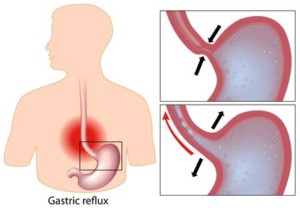Reflux, GERD, Heartburn
GET EDUCATED TO TAKE CONTROL OF YOUR HEALTH
Heartburn is basically a condition where gastric juices back up into the esophagus, causing a burning sensation which radiates upward. It is also called Reflux and when chronic GERD (Gastroesophageal Reflux Disease).

Your esophagus is the tube that carries food from your mouth to your stomach. Normally, a muscle (valve) at the end of your esophagus closes after food is delivered into the stomach.
Reflux happens when this valve does not close properly which allows the stomach contents to leak back, or reflux, into the esophagus and irritate it.
Symptoms
You may feel a burning in the chest or throat, nausea, upper abdominal pain (usually after meals) flatulence and belching (gas), abdominal distension after eating, a sense of fullness after eating. Sometimes, you can taste stomach fluid in the back of the mouth. This is what is referred to as “acid indigestion.”
If you have these symptoms more than twice a week, it is called GERD. GERD which can be accompanied by hoarseness or wheezing, painful or difficult swallowing, vomiting, dramatic weight loss, with increased severity of symptoms over time.
Why doesn’t the valve close properly?
The valve on top of stomach is controlled by the pH of the stomach or the acidity of the stomach acid. The stomach acid must be 1- 3 pH for this to work properly. If the stomach is too alkaline (not acid), it will not close and the acid will splash up. Alkaline means that it is not the correct pH needed by the stomach to digest food. Stomach acid needs to be very acidic.
Have you ever taken antacids for stomach problems, did it help? If not, it is most likely because the stomach was not too acid, but was not acid enough.
Why is the Stomach Important? – Digestion
Digestion is necessary to extract nutrients from the food you eat. The stomachs job is to digest the nutrients. The stomach breaks down protein and the collagen in the protein.
It breaks down food into amino acids which are necessary to build the body. This also makes neurotransmitters and hormones.
Pepsin enzyme is needed to digest protein and the collagen in the protein. Enzymes are only triggered by the low 1-3 pH.
The stomach is also necessary for the absorption of minerals.
Advantages to low pH
A low pH of the stomach acid is necessary for the release of bile. Bile is necessary for the absorption of fat soluble vitamins and will cause a deficiency of these vitamins if they are not absorbed.
Low pH is necessary for the release of pancreatic enzymes. When you put food in your mouth, the pancreas gets enzymes ready for digestion
Low pH is necessary for the full absorption of minerals.
The low pH also kills off potential microbes. This stops these microbes from getting into the intestine to infect you.
Symptoms of low stomach acid (or low pH)
Indications of faulty digestion is inflammatory conditions of the bowel, trouble with ligaments which effect skin tone, joints, connective tissue and ligaments on the bladder and arteries.
Gas (not fruit or beans) means not enough acid.
Faulty digestion and you can wake up dizzy, have back pain, shoulder pain, not being able to see, dried esophagus. It is needed to absorb B12, cramps due to breakdown in collagen and craving salt.
Lack of absorption of minerals: The first symptom is cramps in the lower calf.
How do you know if you have low stomach acid?
What are the causes of not enough acid in the stomach?
Low sodium (creates alkaline stomach)
Aging – stomach acid gets more alkaline
Antacids – You can think the pain in your stomach is too much acid, but it can be too little acid and incompletely digested food due to that. As above the stomach acid has to be very acid to digest the food.
What do you need to do?
The body needs sodium and other minerals.
When there is high blood pressure and edema from the increase of sodium you need to increase the opposing mineral – potassium. Increase in potassium and sodium is necessary for the adrenals to recharge.
Basically, you need to acidify the body.
See educational video by Dr. Berg – REFLUX
RECOMMENDED:
Support a Healthy Digestive System:
Dr. Berg’s Digestive Kit
Dr. Berg’s Digest Formula
The importance of stomach acids has not been focused on enough. The correct pH (acid level) for the stomach should be between 1 to 3. This is VERY acidic, but is necessary to break down proteins, collagen, absorb minerals (calcium, iron, magnesium, etc.) and B12 as well as to help kill off unfriendly microbes before entering the intestines. A strong acid stomach is also necessary to help release bile from the liver and enzymes from the pancreas.
Gallbladder Formula
Gallbladder Formula contains natural ingredients to help break down gallstones and provide bile salts for bloating and digestive stress.
This product has a blend of gallbladder targeted nutrients to thin bile, reduce digestive stress, break down stones and improve the digestion of fats. Most digestive drugs work by reducing acid and this natural product enhances the bile, a commonly omitted factor.
Support a Healthy Digestive System
Read more: Dr. Berg’s Digestive Kit
STILL HAVE QUESTIONS? EMAIL AND GET YOUR QUESTIONS ANSWERED.
Sign up to receive the MCVitamins Newsletter!
Up-to-date info on the latest health-related news happening in the world
(available in English only)

